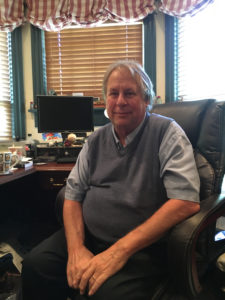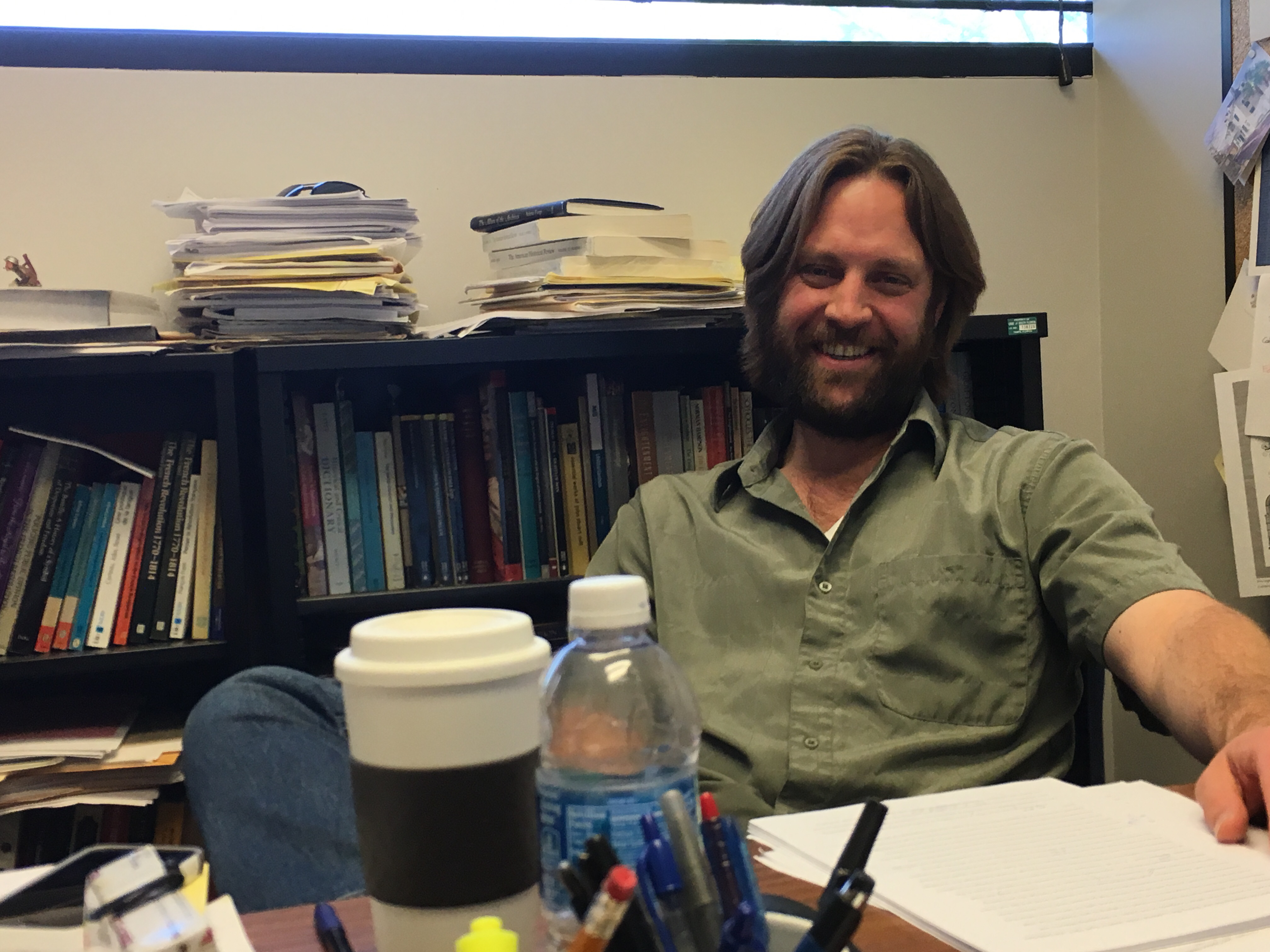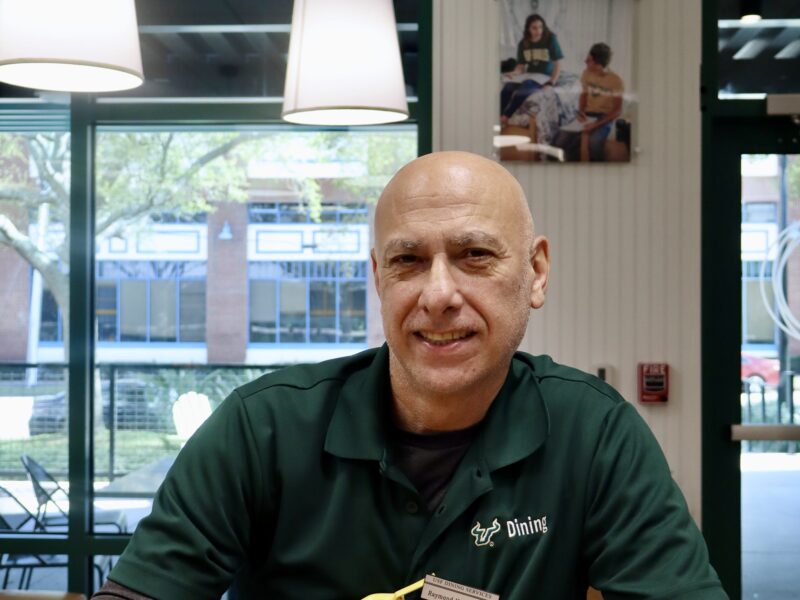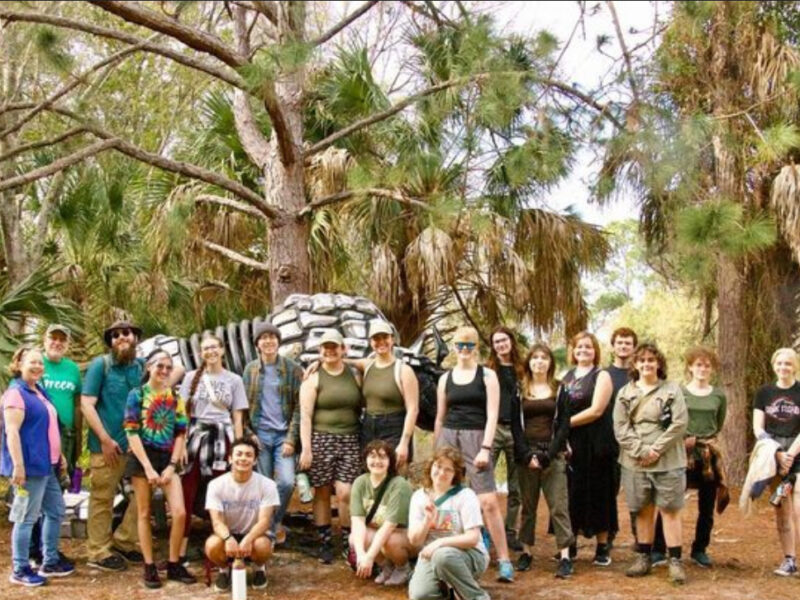Above photo: “We could’ve made that final list of 15 (applicants) three or four times over and not seen a drop in the quality of the applicant,” Dr. Adrian O’Connor said. Delaney Brown | The Crow’s Nest
By Delaney Brown
USF St. Petersburg is known for its marine research and waterfront views, but there’s another department that’s been making waves at the bayfront campus: the department of history and politics.
The research of three professors in particular has driven a new wave of interest in the growing department.
Dr. Adrian O’Connor, assistant professor of history, published “In Pursuit of Power: Education and revolution in eighteenth-century France,” a book examining the political power structures of the French Revolution, in November 2017. He then took over editorship of “The Historian,” a history journal with international readership.
Dr. J. Michael Francis, Hough Family chair of Florida studies, received national recognition for the creation of the La Florida archive, the first interactive, online collection of records of Florida’s early settlers. It is considered by many historians to be one of the most ambitious history projects taken on this year.

And Dr. Raymond Arsenault, senior professor and civil rights historian, is set to release his biography of tennis player Arthur Ashe later this year, which will be his third book on black historymakers.
Now, after a nationwide search, the department welcomes environmental historian Erin Mauldin. Her research examining race, environment and economic inequality, joins the stacked team of historians by way of Samford University in Birmingham, Alabama.
The tenure-track position attracted 234 applicants from universities across the country. Arsenault and O’Connor, members of the search committee, admitted they had trouble narrowing down the list of applicants.
“We could’ve made that final list of 15 (applicants) three or four times over and not seen a drop in the quality of the applicant,” O’Connor said.
A dynamic department
Though the history major has existed since the school’s early years, a history department did not exist at USF St. Petersburg until the university achieved separate accreditation in 2009.
For Arsenault, who joined the university in 1980 when there were only two historians on campus, the growth is astounding.
“Over the past eight years we’ve built something to be absolutely proud of,”Arsenault said.
The department is small compared to others in the Southeast, but professors within the department say that does little to dampen the quality of the education students receive. They say the department is more like a boutique than a buffet: what they lack in quantity they make up for with quality.
“There are some great large departments, like the University of North Carolina, Duke and Vanderbilt, but there are large departments that have a certain amount of deadwood,” Arsenault said. “We have a consistent quality. I think you’d be hard-pressed to find any other university in the Southeast that can top it.”
The history and political science department has 15 full-time professors, six of whom are historians.
Though smaller than programs like the one at University of California, Los Angeles, O’Connor believes students taking history classes at USF St. Petersburg can experience the same degree of intellectual stimulation.
“Since we’re a relatively small program, we can’t offer quite as large a range as other schools,” said Larissa Kopytoff, a visiting instructor whose research deals with Africa and imperialism. “What we do really well is let students explore what they’re interested in.”
Whereas professors in large departments have other professors or doctoral candidates with similar research interests, professors at USF St. Petersburg bounce ideas off of their students.
“We’re aware of the need to generate the mini-specialist cultures here on campus,” O’Connor said. “It means getting people involved in what we’re interested in.”
That may mean getting students interested in imperialism in Africa, the freedom riders of the ‘60s or, for Francis’ students, 16th century Spanish handwriting.
“I’m always amazed of the cohort of students Francis has working on the La Florida project,” said O’Connor. “Getting other people passionate about paleography… people have been tried for wizardly for less!”
Small in size, large in opportunity

Students and professors say there’s no shortage of opportunity in the department.
Some students have landed internships at local museums like the St. Petersburg Museum of History and the Florida Holocaust Museum. Others have spent time in Seville, Spain transcribing 100-year-old Spanish documents. One student works as the assistant editor of “The Historian.”
“I don’t know of another peer-reviewed journal of this size where an undergrad gets to be an assistant editor,” O’Connor said. “Each year we get to give one to two students the chance to do work that is usually done by advanced PhD students in dialogue with scholars at the top of their respective fields.”
Kopytoff admits that finding undergraduates that have opportunities to contribute to research is rare at other schools. In the future she hopes there will be even more opportunities for undergraduate students to participate in research.
“There are programs across the country that serve as feeder programs, where students that come through with a bachelor’s or master’s are immediately given attention when they apply for graduate positions or jobs across the country,” O’Connor said. “I think we’re very well positioned to become that kind of program.”



